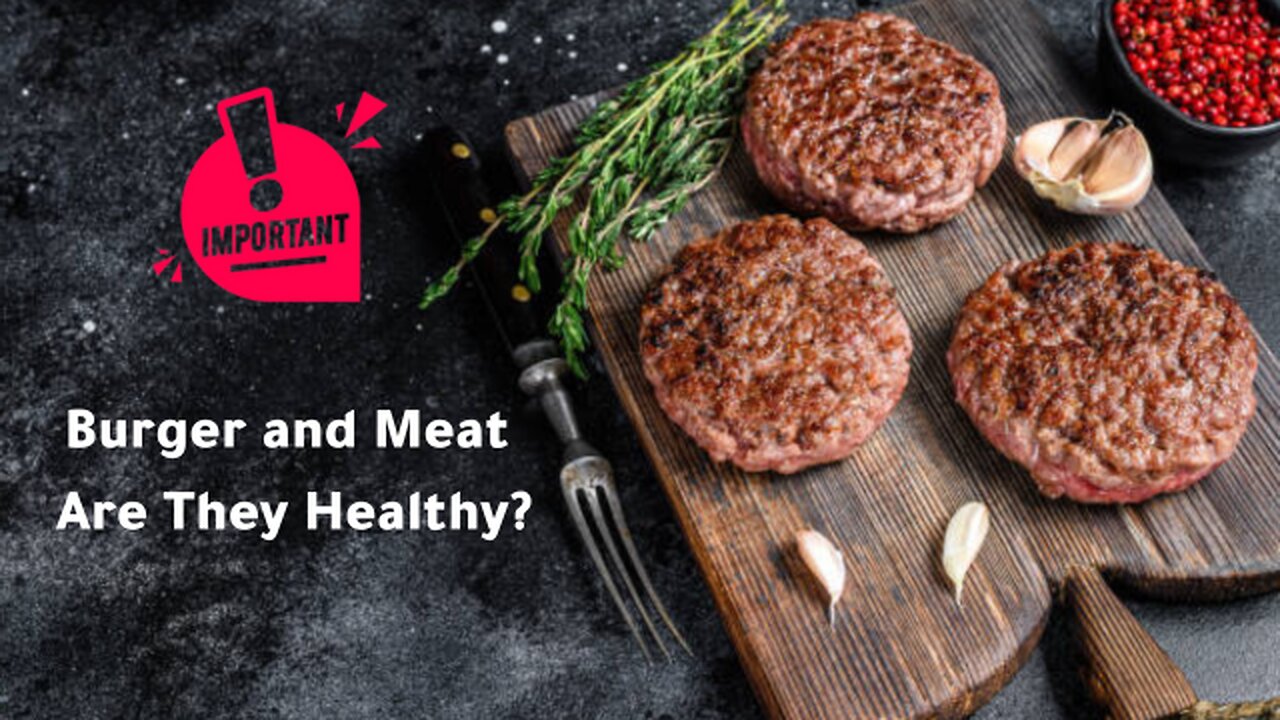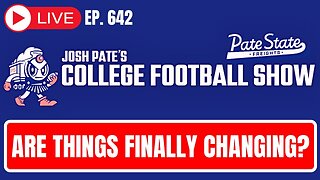Premium Only Content

Burger and Meat : Are They Healthy?
Global meat production has skyrocketed over the last half century, with pork and poultry meat now exceeding 100 megatons a year, 100 million tons, and this growing demand is unsustainable.
The reduction of animal products is arguably one of the most impactful ways in which individual consumers can alter their diets to possibly impact individual and societal wellbeing, and there's a definitely growing interest in plant based diets and meat reduction. But even just something like Meatless Mondays requires dietary change and sadly neither sustainability or health approaches are likely to work with those who love their meat. But swapping and plant based meat substitutes may help.
Help kind of disrupt the negativity about reducing meat, but for hardcore meat eaters, it's got to taste like it and look like it. It's interesting. The more people consume meat substitutes, the less likely they are to care that has a similar taste, texture, appearance or smell of meat. But to appeal to those who really need them are the meteor the better. This has certainly been accomplished with the spate of new products on the market with all studies of grain that they're.
Healthier for the planet, but what about healthier for us? Comparing labels of the burgers and looking at for the worst components of the food supply, trans fats, saturated fats, sodium, and cholesterol, the plantbased burgers win hands down when it comes to trans fat and cholesterol. We all know trans fats is a serious potential risk factor for cardiovascular disease, cancer, and diabetes, but it's also been recently associated with.
Symptoms of depression Lower testosterone in men even just like 1% of calories and dementia. Higher levels of trans fats in the bloods associated with up to 50%. High risk of developing dementia, including Alzheimer's. Now that partially hydrogenated oils have been phased out of the food supply, the only major source of trans fats left will be from animal products. What's the.
Tolerable Upper Daily Intake Level for trans Fats and Upper Limit was not set for trans fat by the Institute of Medicine because any incremental increase in trans fat intake increases the risk of heart disease, the number one killer of men and women, as in any intake above 0.
Because trans fatty acids are unavoidable in diets that can take meat or dairy, consuming 0 trans fat would require significant changes in patterns of dietary intake.
One of the authors to the report from Harvard's nutrition department, offered a memorable explanation for why the Institute of Medicine panel didn't you know, cap it at zero. We can't tell people to stop eating all meat and all dairy products, he said. Well, we could tell people to become vegetarians yet, and we were truly basing this only on science. We would, but it is a bit extreme.
Wouldn't want scientists to base anything on science, now would we know. But anyways, that's a big advantage. And of course, no hormones, no antibiotics, hasn't been, you know, designated as probably cancer causing by the World Health Organization and on and on. Now I'm not happy with the added salt, which is about 1/4 the American Heart Association is 1500 milligram daily upper sodium limit or the saturated fat.
Thanks to added coconut oil, but these two seem to be outliers. I'm in the largest study of the nutritional value of plant based meats today. Saturated fat levels of similar products only average about two grams per serving, much better than the animal based equivalents. Sodium remains a problem throughout the sector, though like nearly any other processed food out there. How processed are.
These products, well, I mean, if you look at the fiber content, for example, yes, I mean to see any fiber in a burger, that's a good thing. But I mean compare that to a whole food, right? If you ate the same amount of protein from yellow peas, for example, the primary plant protein, and beyond burgers, there'd be almost no saturated fat and sodium and a whopping 20 grams of fiber. So yes, you know, processing plants in a processing plant can eliminate 90% of the fiber, but processing plants through animals eliminates.
100% of the fiber. So of course, as the chair of Harvard's nutrition department put it, you know, nutrition policies and dietary guidelines should continue to emphasize a diet rich in whole plant foods, such as nuts, seeds and legumes or pulses, which are rich in protein and many other nutrients but require little industrial processing. But we shouldn't let the perfect be the enemy of the good. Not everyone can go all you know kale and quinoa overnight.
The choice on the Burger King menu is in between this and this, right? But between this and this, and in that case, it's a number brainer.
https://www.majalatsayidaty.com/
https://www.infocancers.com/
-
 2:26:29
2:26:29
vivafrei
12 hours agoEp. 270: MASSIVE SCOTUS WINS! Big Beautiful Bill! New-Scum Sues! Diddy Watch! Big Apple Rot & MORE
79K49 -
 57:30
57:30
RiftTV/Slightly Offensive
2 hours agoTHIS is Where It ALL Went Wrong.. The Rise of NEOCONS | Rift Book Club | B1E2
8.56K10 -
 5:13:57
5:13:57
Barry Cunningham
5 hours agoBREAKING NEWS: SENATE FINAL DEBATE AND DISCUSSION ON BIG BEAUTIFUL BILL
122K70 -
 LIVE
LIVE
EricJohnPizzaArtist
4 days agoAwesome Sauce PIZZA ART LIVE Ep. #52: GEYCK!
123 watching -
 1:17:14
1:17:14
Sarah Westall
7 hours agoPolitical Rhetoric, War and Open Borders Breeding Dangerous Extremist Cells w/ Carole Lieberman
82.9K28 -
 LIVE
LIVE
Josh Pate's College Football Show
4 hours ago $0.13 earnedCFB’s Team To Beat | Recruiting May Be Back | Better OR Worse In 2025 | Truth About Brent Venables
42 watching -
 LIVE
LIVE
SpartakusLIVE
2 hours ago#1 Texas FARMBOY Turned World-Wide Gaming SUPERSTAR amasses NERDS in chat from the ENDS OF THE EARTH
166 watching -
 43:38
43:38
Patriots With Grit
22 hours agoPoverty to Prosecutor; The Food Stamp Warrior | John Deaton
2.64K1 -
 4:17:49
4:17:49
Amish Zaku
7 hours agoParty Animal Sesh hosted by Cewpins
11.5K -
 LIVE
LIVE
AoAGeneral
7 hours agoDarktide: New Class Arbites 1 To 30
54 watching